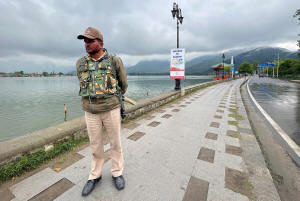India's top court upholds end of special status for Kashmir, orders
polls
 Send a link to a friend
Send a link to a friend
 [December 11, 2023]
By Arpan Chaturvedi and YP Rajesh [December 11, 2023]
By Arpan Chaturvedi and YP Rajesh
NEW DELHI (Reuters) -India's Supreme Court upheld on Monday a 2019
decision by the government of Prime Minister Narendra Modi to revoke
special status for the state of Jammu and Kashmir and set a deadline of
Sept. 30 next year for local polls to be held.
India's only Muslim-majority region, Jammu and Kashmir has been at the
heart of more than 75 years of animosity with neighboring Pakistan since
the birth of the two nations in 1947 at independence from colonial rule
by Britain.
The unanimous order by a panel of five judges followed more than a dozen
petitions challenging the revocation and a subsequent decision to split
the region into two federally administered territories - Jammu and
Kashmir, and the Buddhist territory of Ladakh.
It sets the stage for elections in Jammu and Kashmir, which was more
closely integrated with India after the government's move, taken in line
with a longstanding promise of Modi's Hindu-nationalist Bharatiya Janata
Party (BJP).
The decision is a shot in the arm for the government before a general
election due by May.
The challengers maintained that only the constituent assembly of Jammu
and Kashmir could decide on the special status of the mountain region,
and contested whether parliament had the power to revoke it.

The court said special status was a temporary constitutional provision
that could be revoked. It ordered that Jammu and Kashmir should return
to being a state at the earliest opportunity.
"Article 370 was an interim arrangement due to war conditions in the
state," Chief Justice D.Y. Chandrachud said, referring to the provision
of the Indian constitution which provided the special status after the
first India-Pakistan war over the Himalayan region.
"Textual reading also indicates that it is a temporary provision,"
Chandrachud said.
Modi called the judgment "a beacon of hope, a promise of a brighter
future".
"It is a resounding declaration of hope, progress and unity for our
sisters and brothers in Jammu, Kashmir and Ladakh," Modi posted on X,
formerly Twitter.
"The court, in its profound wisdom, has fortified the very essence of
unity that we, as Indians, hold dear and cherish above all else."
[to top of second column]
|

A police officer stands guard along the banks of Dal Lake near the
venue of the G20 tourism working group meeting in Srinagar May 24,
2023. REUTERS/Altaf Hussain/File Photo

'ILLEGAL, DISAPPOINTED'
Kashmir is divided between India, which rules the populous Kashmir
Valley and the Hindu-dominated region of Jammu; Pakistan, which
controls a wedge of territory in the west; and China, which holds a
thinly populated high-altitude area in the north.
Pakistan's caretaker government rejected the court verdict.
"International law doesn't recognise India's unilateral and illegal
actions" of 2019, caretaker Foreign Minister Jalil Abbas Jilani
posted on X.
"The judicial endorsement by the Indian Supreme Court has no legal
value," he said, adding Kashmiris have an inalienable right to
self-determination in accordance with U.N. Security Council
resolutions.
Islamabad would write to the U.N., the Organisation of Islamic
Cooperation and the European Union to apprise them of the Indian
court decision and its "illegality", Jilani added.
Political parties in Kashmir that opposed the revocation, and were
among those that went to court, said they were disappointed by the
verdict.
Security was stepped up before the verdict in a region roiled by
militant violence and protests since the start of an anti-India
insurgency in 1989. Tens of thousands of people have been killed,
although violence has tapered off in recent years.
"Disappointed but not disheartened," Omar Abdullah, a former chief
minister and vice president of the Jammu and Kashmir National
Conference party, posted on X. "The struggle will continue. It took
the BJP decades to reach here. We are also prepared for the long
haul."
Mehbooba Mufti, another former chief minister and president of the
Jammu and Kashmir People's Democratic Party, echoed those views.
"The people of J&K are not going to lose hope or give up. Our fight
for honour and dignity will continue regardless. This isn't the end
of the road for us," she posted on X.
(Additional reporting by Rupam Jain and Shivam Patel in New Delhi,
Fayaz Bukhari in Srinagar and Asif Shahzad in Islamabad; Writing by
YP Rajesh; Editing by Clarence Fernandez, Timothy Heritage and Alex
Richardson)
[© 2023 Thomson Reuters. All rights
reserved.]This material
may not be published, broadcast, rewritten or redistributed.
Thompson Reuters is solely responsible for this content. |